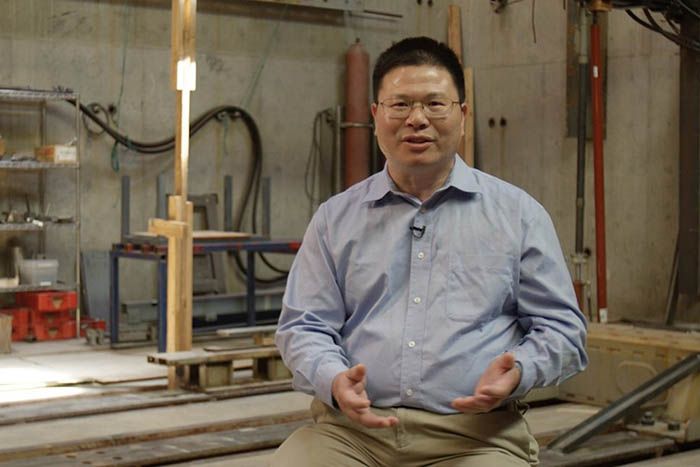
Oregon State University wood chemist Kaichang Li's curiosity about mussels helped him find an alternative solution to a cancer-causing chemical used in commercial plywood adhesive.
The first time Oregon State University wood chemist Kaichang Li tried mussels, he didn’t focus on flavor or texture. Instead, he was bewildered by how tightly the bivalve mollusks cling to rough, unwashed surfaces, leading him to save a few for the lab. Dr. Li dove into existing research on marine adhesive proteins – the compounds responsible for mussels’ stickiness – which have special amino acids making them both sticky and water resistant.
At the time, most mass-produced commercial plywood, used in everything from home furniture to kitchen cabinets, was made with formaldehyde-based glue that released gasses linked to cancer, as well as a myriad of respiratory ailments. This problem inspired him to develop a new, safer glue for commercial plywood-based products. He thought the answer might lie in marine adhesive proteins, but Dr. Li quickly realized that producing these proteins by using mussels was far too costly. This led to another meal-time revelation: tofu.
Tofu is soy-based and soy beans are the second-most planted field crop in the U.S., and largely made of sticky proteins, making soy a plausible alternative to sticky mollusk proteins. After refocusing his research to a new muse, Dr. Li learned that adding soy protein, water, and a common, commercially available wet strength agent – like those used in tissue paper – resulted in a superior wood adhesive. This discovery caught the attention of Columbia Forest Products, the largest manufacturer of hardwood veneer and hardwood plywood in the country. Columbia Forest Products announced it would remove urea-formaldehyde glue from all its plants and convert fully to soy-based glue. Eventually much of the industry followed suit.
Today, some 60 percent of the plywood and veneer industry have abandoned the formaldehyde-based wood glue and opted for Dr. Li’s game-changing soy adhesive, and a national standard is set to take effect December 2017. Without funding from the U.S. Department of Agriculture, Dr. Li’s curiosity-driven discovery may have never been.
This year, Dr. Li received a Golden Goose Award to recognize his bioinspired invention, joining a distinguished gaggle of awardees. The annual award celebrates scientific success stories by recognizing the tremendous human and economic benefits of federally funded research that often seem obscure or superfluous at the outset.
The very nature of scientific research, like that of Dr. Li’s, is that its impacts are often hard to predict. Recognizing the need for innovative, risk-taking research, the federal government forged a unique partnership with American universities to conduct research to grow our economy, improve public health, and strengthen national security. The government provides university researchers with competitively awarded grants to support the people, tools, and infrastructure necessary to conduct the highest quality scientific research for the American people.
Why invest in curiosity-driven scientific research? For Dr. Li and the American economy, the proof is in the plywood.